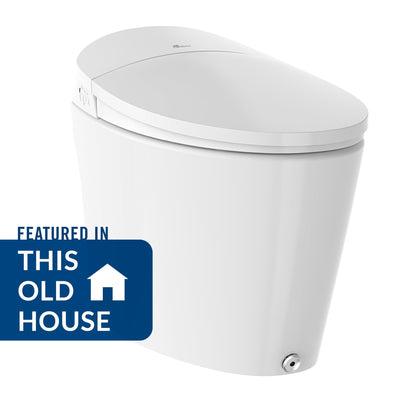Easing the Hemorrhoids Symptoms at Home

No one wants to talk about hemorrhoids, but you'll probably have to at some point. Nearly three in four adults experience hemorrhoids at least once in their lifetime. Understanding how to spot symptoms early, knowing what treatments are available, and using a bidet to reduce inflammation can make your experience less severe.
Get the lowdown on hemorrhoids so you're ready to ask your healthcare provider the right questions.
What Are Hemorrhoids?
Also known as piles, hemorrhoids are swollen veins in or near the anus and rectum. Anal hemorrhoids are referred to as external, with rectal hemorrhoids categorized as internal. Your doctor may use these terms to diagnose your condition and shape your treatment plan.
Common (and Painful!) Hemorrhoid Symptoms
Early signs and symptoms of hemorrhoids are uncomfortable no matter which type you have. There are clear differences in how internal and external hemorrhoids impact your health.
- External – Itching, swelling, pain, and bleeding around the anus
- Internal – Bleeding during bowel movements or a protruding vein that passes from the rectum to the anus, which is as painful as it sounds
You should contact a healthcare provider any time you notice blood in your stool or substantial changes in your digestive health.
Related: Are Bidets Healthy? 5 Health Benefits of Using a Bidet
What Causes Hemorrhoids?
Hemorrhoids are usually caused by increased blood pressure, although doctors believe there may be other factors. Certain risk factors make individuals more susceptible to hemorrhoids, such as:
- Being overweight or obese
- Being pregnant
- Chronic digestive problems, such as diarrhea and constipation
Lifestyle habits may also play a role in developing symptoms. Researchers have also found a correlation between hemorrhoids and:
- Low-fiber diets
- Weightlifting
- Sitting for long periods
- Straining or pushing during bowel movements
What Are Pregnancy Hemorrhoids?
The last thing pregnant women want to deal with on top of everything else is a case of itchy hemorrhoids. Many mothers-to-be experience symptoms because of increased blood pressure, constipation and needing to strain when using the toilet.
All hemorrhoid sufferers, including pregnant women, can reduce the risk of a flare-up by following these tips …
How to Prevent Hemorrhoids
These healthy habits can help avoid hemorrhoid flare-ups, especially for adults over 50. As we age, vein walls weaken and become more prone to inflammation.
- Eat a high-fiber diet to reduce the risk of constipation
- Ask your doctor about fiber supplements and stool softeners to address constipation early
- Exercise regularly
- Drink plenty of water (men should drink 15.5 cups of water per day, women 11.5 cups per day)
- Use a gentle bidet spray to reduce irritation and inflammation caused by toilet paper
How Long Do Hemorrhoids Last?
Each flare-up is different. Many cases will go away without treatment in just a few days. More severe cases may require medical treatment.
The most common hemorrhoid self-care advice is to change habits that may provoke symptoms and reduce irritation.
- Avoid sitting or sleeping on your backside to reduce pressure on your rear
- With professional supervision, use over-the-counter hemorrhoid creams
- If constipated, use stool softeners to make it easy to go
- Avoid anything that causes pain, including toilet paper, certain types of exercise, or sitting for long periods
Talk to your healthcare provider if symptoms haven't improved in a week.
Why Are Bidets Good for Hemorrhoids?
For those with hemorrhoids, using a bidet is less irritating than wiping. The best bidet for hemorrhoids will include the ability to adjust water pressure and may have a supply of warm water. Some users prefer cool, room-temperature water to ease symptoms.
Do Bidets Prevent Hemorrhoids?
There's little evidence that using a bidet can prevent hemorrhoids, although it is less irritating on the skin than toilet paper. Most causes of hemorrhoids aren't related to toilet use, but the bathroom is often where symptoms are the most uncomfortable.
Make the Best of a Bad Situation with a New Bidet from Bio Bidet by Bemis
Rest, recover, and heal from hemorrhoids at your own pace. You can also quickly ease itchy hemorrhoid symptoms with a bidet seat or bidet attachment. You'll experience what a daily splash of luxury can do for your hygiene and your environmental footprint!
Take the Bidet Quiz to find the right model for your home, and please reach out if you have questions.




